PETERBOROUGH TO PORT AUGUSTA
Before we left Peterborough we had to see if we could find who ran the shop with the sewing machine in the window and if we could have a look at it. Fortunately, by asking at the post office we did find the owner.
I am now the proud owner of a very unusual German portable sewing machine. It is missing its knee lever, needs a new handle on the case and will not turn over. Therefore, we paid much less than the asking price. It will be a project for when we get home. It is about the size of my little Elna Stella and it appears that the case acts as an extension table. I will have to do a bit of research. Of course, everything is in German, which doesn’t help.
We only had a relatively short drive this time. You could see that we were going to enter some cloudy and potentially wet weather, looking at that front coming across the sky.
We were now entering an area where their was some farming, rather than just the occasional grazing.
The first town we came to was Orroroo. It had an interesting sculpture in the Main Street.
There were signs for a giant gum tree, so we went and checked it out. We wondered how giant it would be, as most trees in the area are rather small and scrubby.
Well, it isn’t a giant height wise, compared to many we have seen, but it certainly was a giant around the girth. Apparently, it has a circumference of 10.61 metres and is estimated to be over 500 years old.
There was another interesting old hollow tree next to it s well.
We had been looking forward to visiting Wilmington, the next little town, as Mick had previously visited a toy museum there and it had been closed when I had come through last time. This time it was open.
Mick had fun picking out the Matchbox toys that he had as a boy, I loved the Meccano harbour bridge.
There were so many different things to see. There weren’t that many girls’ toys, but as it was a man’s collection, that probably made sense.
The town also had some lovely old stone buildings.
After travelling on straightest, flat roads for a very long way, we had to travel through Horrocks Pass, a winding hilly pass through the very bottom of the Flinders Ranges.
Once you pop out the other side you are greeted by the sight of a wind farm on the flats, east of Port Augusta.
Behind you are the Flinders Ranges.
We arrived at Port Augusta in the early afternoon and got settled in a caravan park, before heading out for a bit of an explore.
We had driven over a brand new bridge across the top of the Spencers Gulf. They have just started work on upgrading the older bridge, so it will be dual carriageway. That was some big crane.
We saw a water tower at the top of the hill, so drove up to have a look. It turns out it is no longer a water tower, but you can climb to the top and it is a lookout. I’m not the best with climbing ladders or stairs that you can see through. Therefore, I only climbed to the platform halfway up. It the stairs hadn’t been mesh I would have been OK. I always hate myself for not being confident enough to go further, but that is just how it is. Maybe one day I will put my big girl pants on and manage to be braver.
We had a wander up and down the Main Street. It was very quiet. It was brightened by a couple of recent murals.
In a park we saw a statue of a previous mayor. I decided to sit and have a chat.
After that, we just had a quiet time back at the van.
The forecast rain consisted of a couple of spitty showers and a decent shower in the early evening.
The Highlight of the Day for me was finding the very unusual sewing machine and for Mick it was the Toy Museum.
PORT AUGUSTA
We had a full day in Port Augusta today. After visiting the information centre yesterday, we planned to spend the morning at The Australian Arid Lands Botanic Garden.
We read that there was a guided tour at 10 o’clock, so made sure we were there in plenty of time for that. The tours are conducted by members of The Friends of the Botanic Garden. Our guides were Chris and a new recruit, Emily. They were both so knowledgeable and enthusiastic about the garden and the plants and birds therein.
The gardens cover an area of over 250 hectares and contain over 12kms of walking tracks and paths. Over 150 bird species have been recorded in the gardens. They were established in 1993 and were officially opened in 1996. At the centre of the gardens is a visitors centre and the Bluebush Café. There is even a plant nursery where they sell plants propagated on site. All the plants grown are from areas of Australia which receive less that 250mm of rain annually.
A feature is the Eremophila Garden. I’d never heard of them and still have trouble pronouncing the name. It turns out it is the botanical name for the Emu Bush family. I had heard of Emu Bush, but they don’t grow where we live, as they don’t likes frosts.
They come in all shapes and sizes. All the plants in the above photo are of this genus.
Some varieties are pollinated by insects, like the one above. They have a landing place - the little white spot below the stamens. As they enter the flower to reach the nectar, their back rubs on the stamens and they take the pollen with them to the next flower where the pollen will rub off.
Others are pollinated by birds. Those flowers have the little turned back petal, so the bird can get its beak in to reach the nectar and the pollen will rub off onto the top of its beak.
They then produce little nuts that are eaten by emus. They don’t break them up and they are passed through their system. It was thought that this assisted with propagation, but that has recently been found to be untrue. At the gardens they propagate from cuttings.
This one is used extensively in home gardens and is Eremophila maculata, also known as the Lipstick Bush.
You can see why.
Here are a few more. Such variety, and over a wide area. Having said that, most varieties are only found in a relatively small area.
Now for the rest of the garden.
You could sit under a coolabah tree.
This is a bluebush. It is related to saltbush and only grows in Australia.Like saltbush, it retains moisture in its leaves and is a good fodder plant. It is grown commercially in Israel and Australia for the floral industry.
We saw so many interesting plants and learned so much.
I’ve never seen a casuarina in flower before. We learned that all those “needles” are in fact extensions of the branches. See how they are segmented. Well, if you pull the segments apart there is a little sort of serrated edge. Those serrations are the leaves. Who’d have thought.
This a Waddy tree. I’d heard of a waddy being an aboriginal club. They are made from the timber from this tree. It is the hardest wood in the world. They only naturally grow around the Birdsville area and are believed to be a remnant from prehistoric times.
The regal bird flower, because the flowers look like a bird from the side.
The seed pods, when dried, were used by the aboriginal people as rattles for their children.
Mick’s favourite plant was the Porcupine Grass. It is so very sharp. As it grows, it sometimes develops a bare patch in the middle and it is obviously a popular spot for kangaroos to sleep, as it is kind of like a nest.
After our tour, which lasted for nearly two hours, rather than the expected hour, we enjoyed a delicious lunch in the cafe. It was the most wonderful way to spend the morning.
I had noticed that Emily was wearing a very cute handmade blue wren brooch. When I commented on it, she advised that she made it and also sells them. So, I have a cute little brooch to give to Mum when I get home and a Christmas decoration version to give her later in the year. They are gorgeous.
A part of the gardens is the Matthew Flinders Red Cliffs Lookout, so we had a look before we left the gardens. Matthew Flinders sailed to this point in 1802 when he circumnavigated Australia on his ship HMS Investigator.
You have a very clear view of the Flinders Ranges, named in 1839.
We then returned to town and had a walk along the old wharf area. There isn’t much to see now, and what there is, is fenced off, but it had been a very busy place in the late 1800s.
What intrigued us the most was the information and photos about the importation of camels and the cameleers to Australia.
In the late afternoon we returned to the lookout for the sunset, this time looking west.
Some lovely people took our photo.
It was wonderful seeing the gradual colour changes and the soft light over the Flinders Ranges.
When we returned to the caravan park, the sky had changed again. A gorgeous way to end the day.
The highlight of the day for me was the guided tour of the botanic gardens and for Mick it was the sunset.

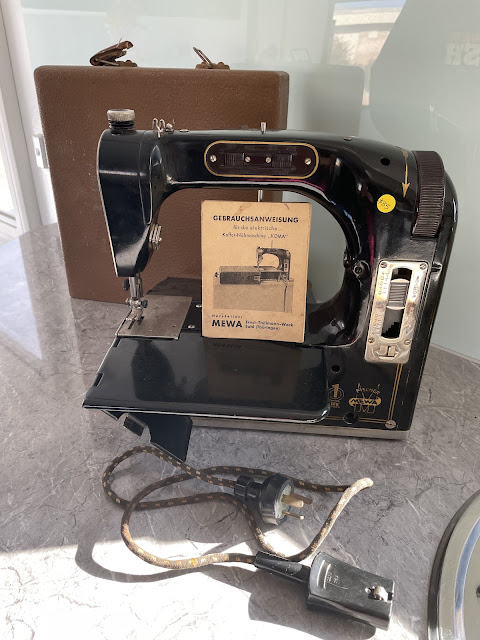





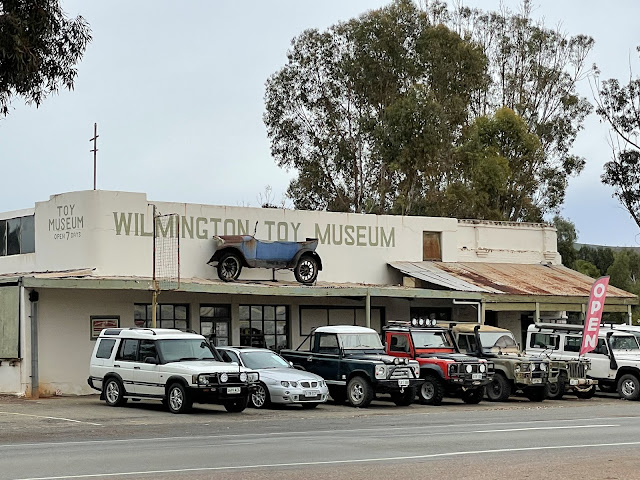






















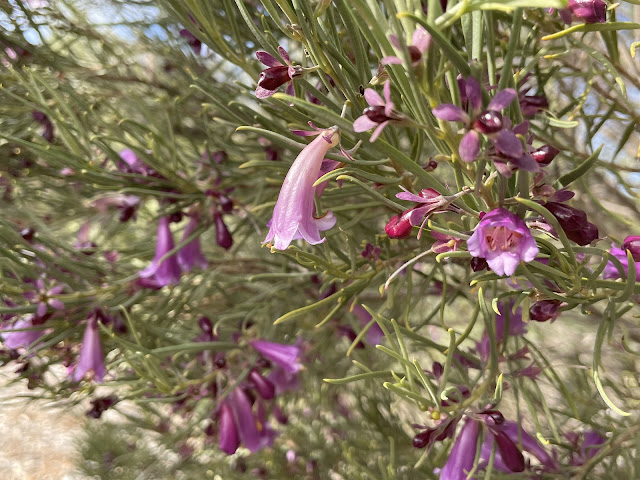


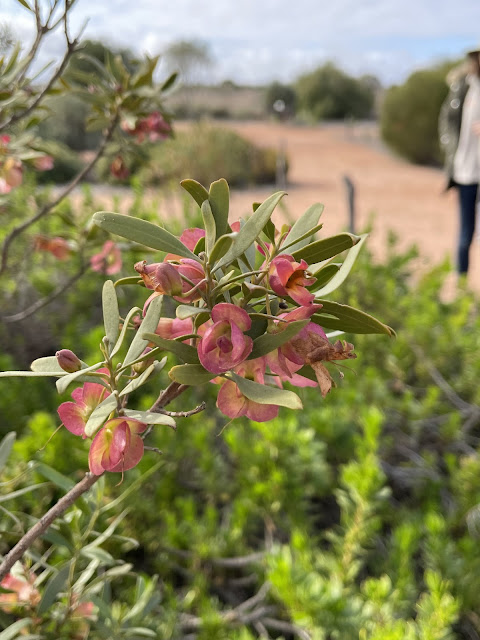













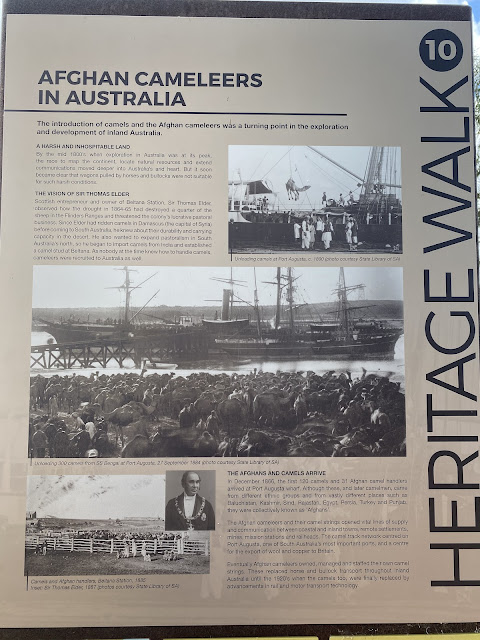






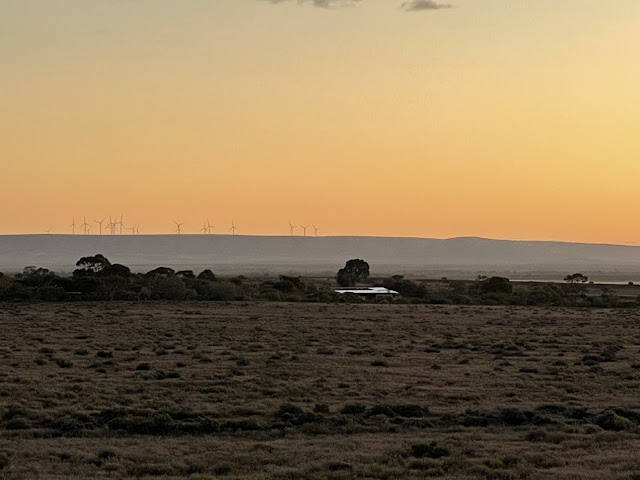


11 comments:
Testing 123
I feel like I am travelling with you. There are some places I have seen but others I have not. You always make it so interesting to travel along with you. Thankyou
The gardens look very interesting, so many lovely flowers.
Trust you to find a sewing machine to take home. LOL
If you have time while here in NZ, check out the toy museum in Christchurch. They have sewing machines. LOL
Very cute machine. I've been enjoying following you around on your journey &learning so much about things. Looking forward to your next post. Hugs,
You are really packing it in, on your first few days away. The toy museum must have brought back many memories for Mick, and the arid garden tour looked very interesting. Lucky you to get that old machine, no doubt when you get back home you can get it serviced. And lucky again to get in the right place to get those pretty bird brooches.
PS. It might be a good idea for me to get the map out to see where your travels take you. We had been to Port Augusta on our Ghan trip, but everywhere else is new to me - Australia is huge!
lovely photos of the area...on my bucket list!
I didn't know about the Waddy tree. Altho I had sung the words I haven't seen a coulibiac tree before either.
What a wonderful couple of days Janice, you are seeing so much. The sewing machine is a little treasure. So many wonderful plants at the gardens. The blue wrens are lovely. Enjoying your trip very much.
Ditto to what Jo said, feel like I'm travelling with you. Thankyou
love the sunset......cool machine....maybe Sylvia can assist in the translation......
I have some emu bushes in the garden......they are great.....
Post a Comment